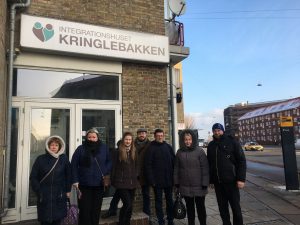 Our partners from Russia, Estonia and Lithuania had only two and a half days to gain experience from Danish organisations that work towards helping new immigrants and refugees to find their place within Danish society. We put together a tightly packed program in order to ensure that they were able to meet with different organisations that have extensive experience within these areas. We owe a huge thank you to our sister organisations such as Kringlebakken, FAKTI, Bydelsmødre and Invandre Kvindecentret all of whom reacted immediately to our request for a meeting and arrived armed with thorough explanations about the work they do.
Our partners from Russia, Estonia and Lithuania had only two and a half days to gain experience from Danish organisations that work towards helping new immigrants and refugees to find their place within Danish society. We put together a tightly packed program in order to ensure that they were able to meet with different organisations that have extensive experience within these areas. We owe a huge thank you to our sister organisations such as Kringlebakken, FAKTI, Bydelsmødre and Invandre Kvindecentret all of whom reacted immediately to our request for a meeting and arrived armed with thorough explanations about the work they do.
At Kringlebakken, a meeting with some of the center’s many visitors was arranged. This allowed our guests the very unique opportunity of being able to hear several integration stories told first hand by the visiting immigrant women. Additionally, at FAKTI we were served soup prepared by Afghan women. The joint meal created an atmosphere in which conversation felt natural, and this meant that our guests and the center’s own visitors quickly were able to find different topics of interest to discuss, and surprisingly, discovered that some even had mutual acquaintances!
While many Afghan refugees reside in Denmark, many find themselves in Russia too. We discovered that a woman’s brother works in Saint Petersburg, near one of our guests. Once more, our attention was drawn to the fact that we live in a globalized world and that it is both meaningless and impossible to close down borders. Our guests from the Post Soviet countries also became familiar with the experience that our own organisation, The World’s Women in Denmark, has gathered and were thereafter able to pose in-depth questions regarding adaptation to new surroundings in their own language.
Furthermore, we arranged a guided tour around some of Copenhagen’s historical locations that have connections to the fight for women’s rights to education, financial independence and anti-violence. To conclude the visit, our guests visited the shop Ishtar – the ethnic liberals, where they were able to see how a socio-economic business, established and run by immigrant women from the Middle East, works. This visit was the first part of a larger project that we are now leading with support from the Nordic Ministry and the Nordic Council.

Comments are closed, but trackbacks and pingbacks are open.